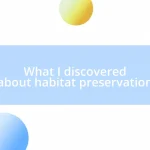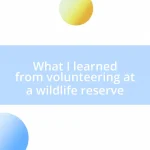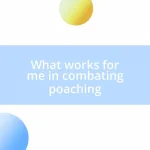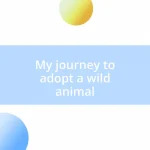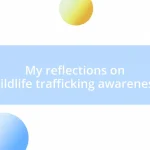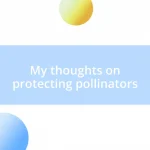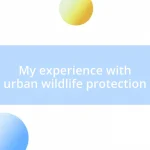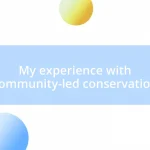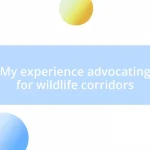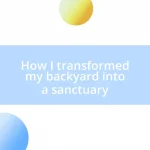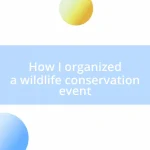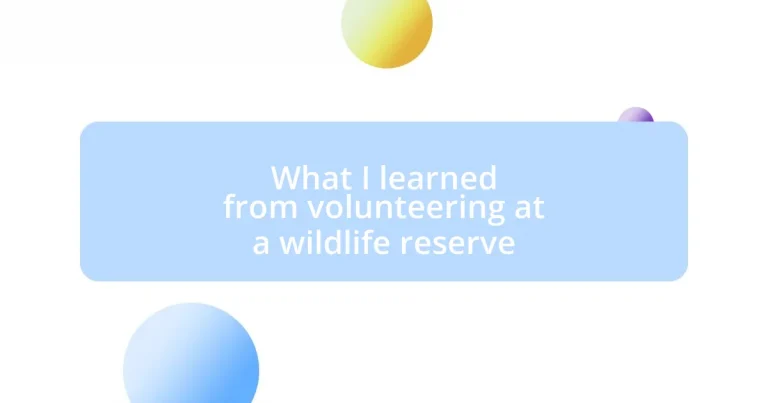Key takeaways:
- Wildlife volunteering involves hands-on experience that fosters personal growth and a deeper understanding of ecological systems.
- The role encompasses diverse responsibilities—feeding animals, cleaning enclosures, and educating visitors—which collectively contribute to both animal welfare and conservation efforts.
- Volunteers develop essential skills such as teamwork, problem-solving, and emotional resilience, which influence their personal and professional lives beyond the reserve.
- Engaging with the community and promoting awareness enhances conservation initiatives, demonstrating the importance of collective action in protecting wildlife.
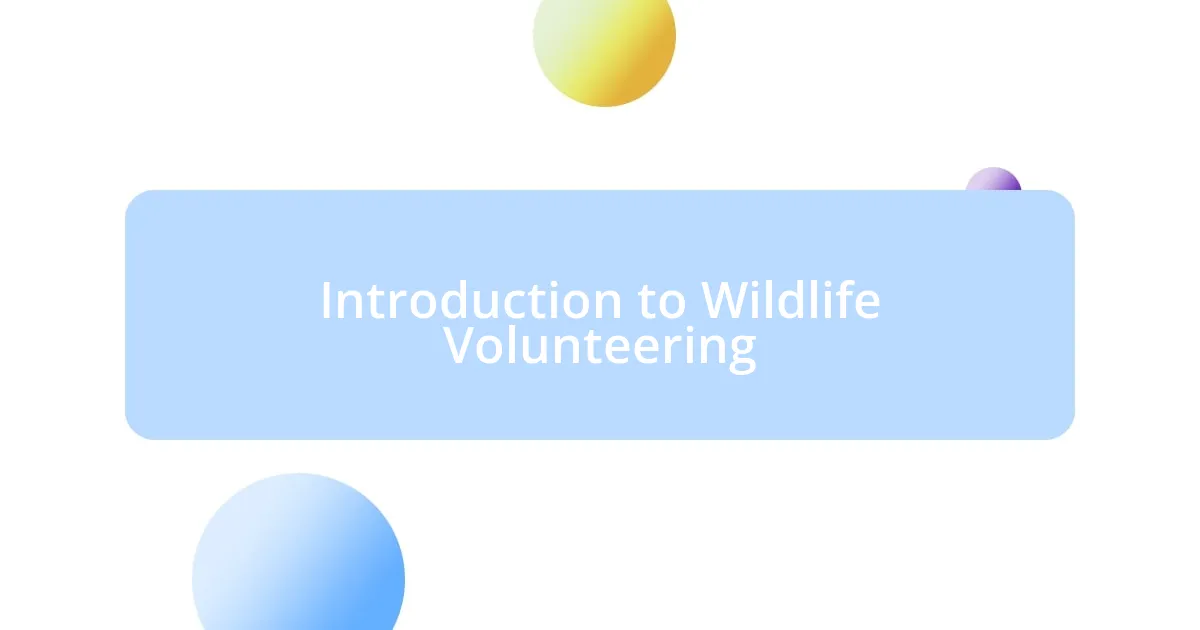
Introduction to Wildlife Volunteering
When I first considered wildlife volunteering, I was struck by the thought of making a difference in the lives of animals while gaining hands-on experience in conservation. The opportunity to work closely with wildlife not only broadened my understanding of ecological systems but also ignited a passion within me to protect these magnificent creatures. Have you ever felt that urge to connect with nature in a meaningful way? Volunteering can be that bridge.
I remember my first day at the wildlife reserve, standing among the towering trees, as the sounds of nature enveloped me. It was overwhelming—in the best possible way. Each moment spent cleaning enclosures or observing animal behavior deepened my appreciation for the intricate balance of ecosystems. It’s one thing to read about wildlife in textbooks; it’s another to see it firsthand.
Volunteering, in my experience, is about more than just helping animals; it’s a journey of personal growth. You find yourself developing skills and gaining insights that you won’t acquire in a classroom. Have you ever noticed how being in nature makes you reflect on your own life choices? For me, it was a catalyst for change, prompting shifts in my perspective and priorities. Wildlife volunteering isn’t just an activity; it’s an enriching experience that stays with you long after you leave.
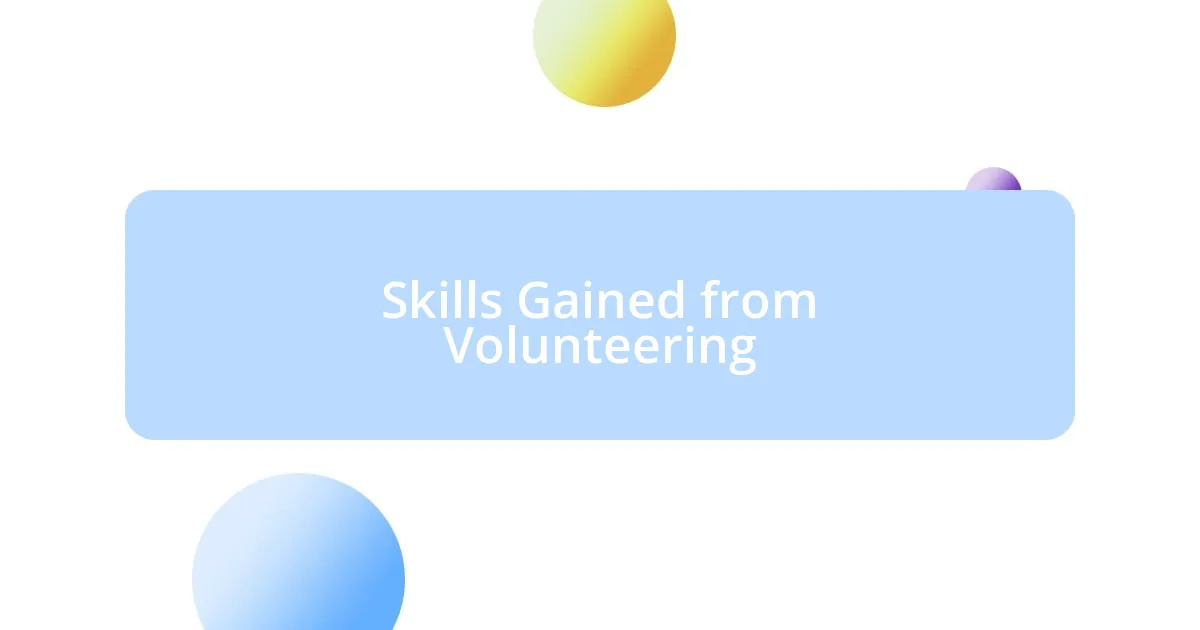
Skills Gained from Volunteering
One of the most surprising rewards of volunteering at the wildlife reserve was the variety of skills I inadvertently developed along the way. For instance, I honed my observational skills by spending hours tracking animal behaviors—something I’d never imagined would be an essential part of my work. I learned to communicate effectively with both animals and fellow volunteers, ensuring that we worked as a cohesive team. I remember a particular moment when a fellow volunteer and I had to coordinate our efforts quickly to assist an injured bird; it taught me the importance of teamwork under pressure and how clear communication can save lives.
Here are some key skills I gained from volunteering:
- Teamwork: Collaborating with others to achieve common goals, especially under challenging circumstances.
- Problem-solving: Developing quick, flexible solutions to unexpected issues that arose in the field.
- Observation: Enhancing my ability to assess animal behavior and environment accurately.
- Communication: Learning to convey information clearly, both verbally and non-verbally, to both humans and animals.
- Adaptability: Adjusting to changing situations and understanding the needs of the animals in my care.
Each of these experiences not only enriched my skill set but also reshaped how I perceive challenges in everyday life. The growth I’ve experienced extends far beyond the wildlife reserve, influencing everything from my career to my personal relationships.
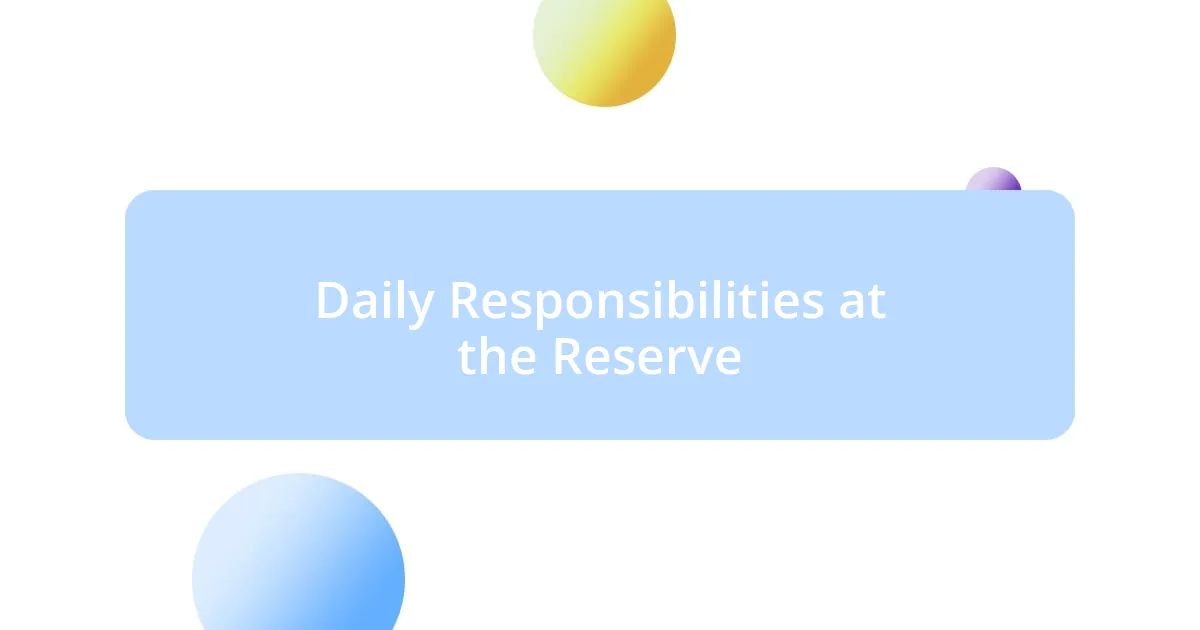
Daily Responsibilities at the Reserve
It’s fascinating how every day at the reserve brought a unique set of duties that contributed directly to the well-being of the animals. Each morning, I found myself waking up early, excited to start the day by preparing food for the various species we cared for. I vividly recall the first time I tried to feed a capybara—his curious eyes and gentle nibbling as I placed fresh veggies in his enclosure left me with an overwhelming sense of purpose. It wasn’t just a job; it felt like nurturing a friendship.
My responsibilities were not limited to feeding; maintaining the enclosures was crucial. I spent time cleaning habitats and promoting a healthy environment for the animals. I still remember the sun beating down on me one afternoon as I scrubbed a particularly stubborn area in the monkey enclosure. Admittedly, it was hard work, but every satisfied chirp and playful swing from the monkeys reassured me that I was making a difference. This rhythm of responsibilities fostered a deep connection to the land and the creatures who called it home.
Engaging with visitors was another responsibility I wholeheartedly embraced. Giving tours allowed me to share my passion and knowledge about the wildlife we protected. I’ll never forget the joy on a child’s face when I explained how our rehabilitation efforts helped injured birds return to the wild. It reminded me that education plays a vital role in conservation. In each of these roles, I experienced a phenomenal blend of hard work, personal growth, and the fulfillment that comes from contributing to a noble cause.
| Responsibility | Description |
|---|---|
| Feeding Animals | Preparing and distributing specific diets for diverse species. |
| Cleaning Enclosures | Maintaining clean and safe habitats to promote health and well-being. |
| Educating Visitors | Engaging with the public to raise awareness and share conservation efforts. |
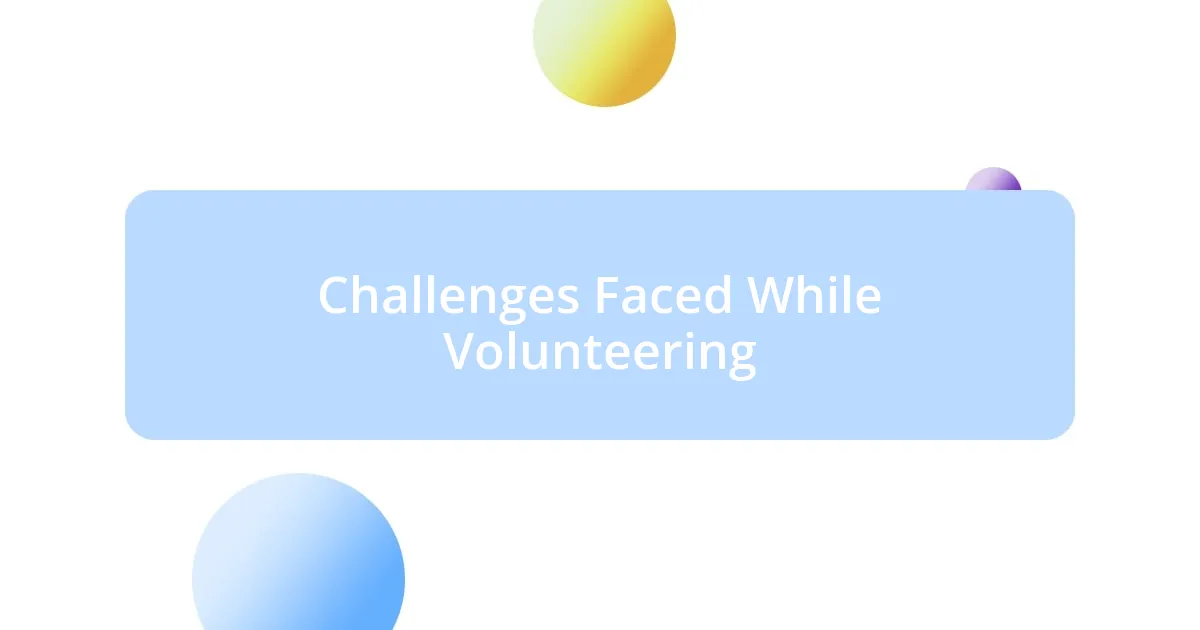
Challenges Faced While Volunteering
Volunteering at the wildlife reserve came with its fair share of challenges, many of which tested my resilience. I remember one particularly grueling summer day when a heatwave struck, and the animals needed extra care. It felt daunting as I dragged heavy water buckets under the sweltering sun; the weight of my responsibility was tangible. I often wondered, was I doing enough for them? That moment pushed me to my limits, yet it also ignited a deeper sense of commitment to the animals.
Another challenge I encountered involved communication. While many of my fellow volunteers were seasoned, I often struggled to keep up with their experience. There were times when tasks were communicated too quickly, leaving me feeling lost. I vividly recall a moment when I mixed up the feed for some animals, leading to an unexpected situation that required swift problem-solving. It taught me that it’s crucial to ask questions, even if it feels awkward at the moment. I realized the importance of open dialogue in ensuring every creature receives the proper care they deserve.
The emotional toll of witnessing animals in distress was also challenging. I often grappled with feelings of helplessness when faced with injured wildlife, particularly during rescue operations. One day, we retrieved a fawn that had been separated from its mother. My heart sank seeing the fear in its eyes. I found myself asking, what can I possibly do to help? But in those moments, I learned that every action counts, no matter how small. I gained a profound understanding that my patience and compassion could play a pivotal role in easing their suffering and facilitating healing.
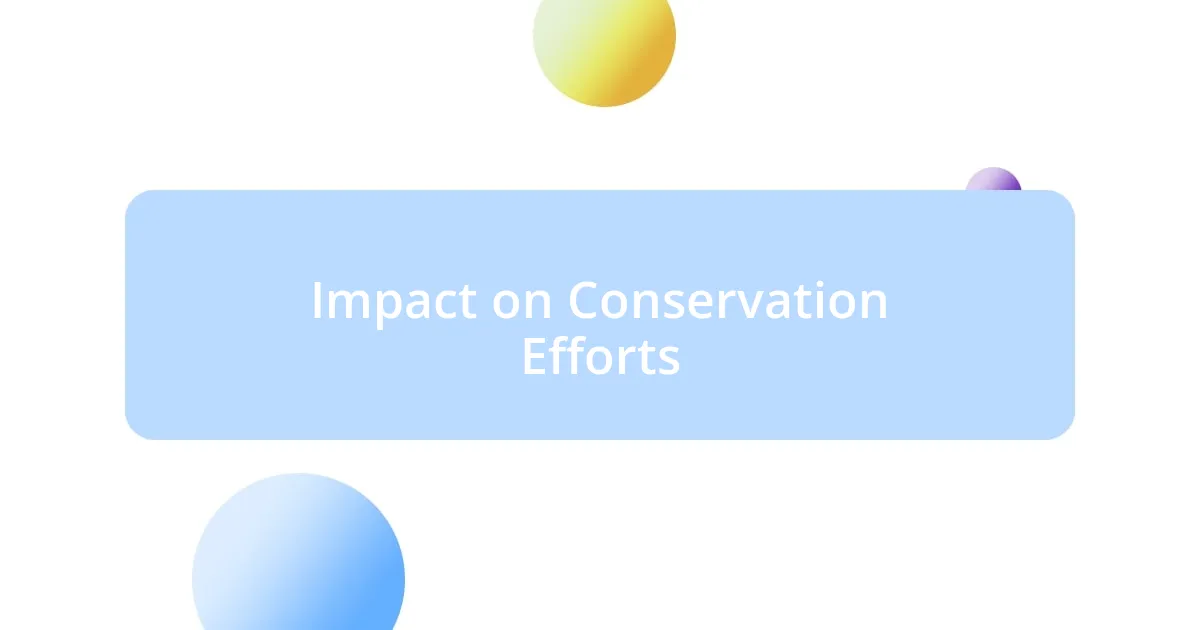
Impact on Conservation Efforts
It’s incredible to witness how volunteer efforts at a wildlife reserve directly contribute to broader conservation initiatives. During my time there, I engaged in habitat restoration projects, which not only improved the living conditions for the animals but also promoted biodiversity. I would often find myself elbow-deep in soil, planting native species that play a crucial role in the ecosystem. Did you know that restoring native flora can help attract essential pollinators? I learned firsthand how this simple act significantly impacts the overall health of the environment.
One memorable day, we worked on a community awareness campaign to educate locals about the importance of preserving natural habitats. As we set up booths and shared stories, I could feel the energy in the air shift. It was rewarding to see people genuinely interested in learning how their actions influence wildlife conservation. I often think back to a conversation I had with a visitor who was previously unaware of the threats endangered species face. The spark in his eyes when he realized he could take small actions in his daily life to make a difference felt like planting seeds of change, reinforcing my belief that education is one of the most powerful tools we have in conservation.
Additionally, collaborating with other volunteers broadened my understanding of the interconnectedness of various conservation efforts. I often found myself discussing strategies with individuals who had different expertise, from veterinary care to environmental science. Each shared insight highlighted how diverse skills and knowledge come together to enhance conservation efforts collectively. It made me appreciate that conservation is not a solo endeavor; it thrives on teamwork and shared goals. Isn’t it fascinating how every small contribution, no matter how insignificant it may seem, plays an integral role in a much larger picture?
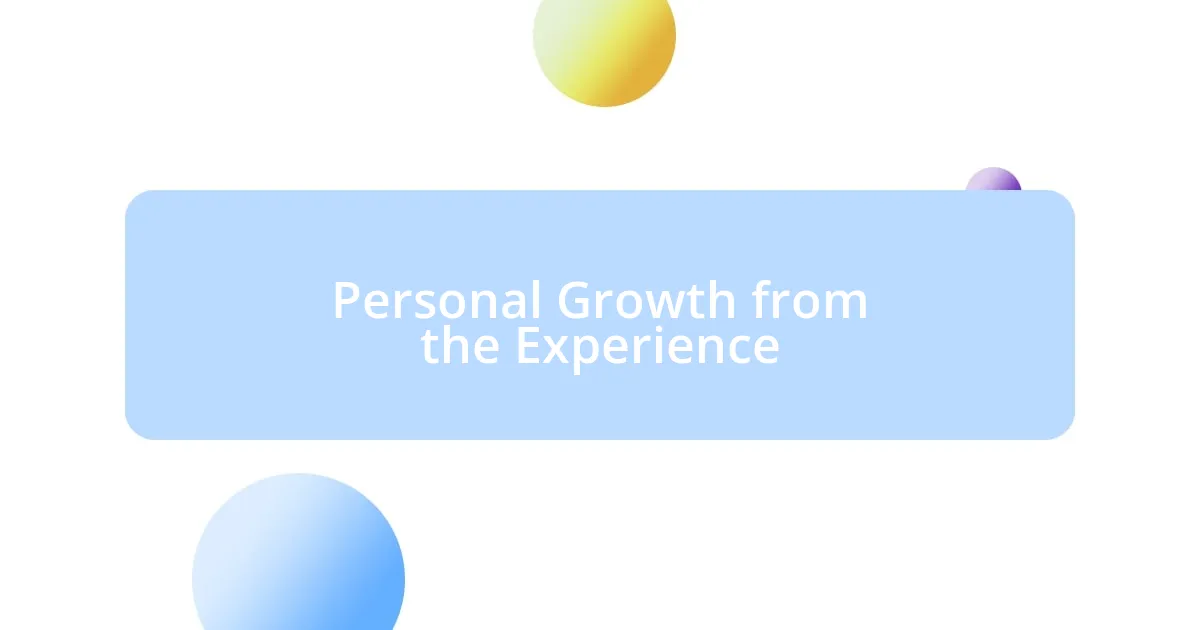
Personal Growth from the Experience
My time at the wildlife reserve was a transformative journey that pushed me beyond my perceived limits. I recall standing by the river, waiting to assist with a turtle rescue. It felt surreal, watching these ancient creatures struggle against strong currents. I remember thinking, “Can I really make a difference?” That moment crystallized for me the essence of dedication; it became clear that my presence mattered, even when the impact felt small.
I also discovered unexpected layers of confidence during my time there. After a few weeks, I found myself leading small groups of new volunteers, explaining procedures and sharing insights. Initially, the thought of speaking up terrified me. The fear of not being knowledgeable enough weighed heavily on my shoulders. But I learned that vulnerability can actually strengthen connections. When I shared my doubts and challenges, others opened up too, creating a supportive environment where everyone felt empowered to learn and grow together.
Perhaps one of the most profound shifts I experienced was in my emotional resilience. There were days when the stress of caring for injured animals felt overwhelming, leaving me emotionally drained. In those quiet moments, I practiced mindfulness—simply breathing and being present. I learned to embrace my feelings instead of suppressing them. What was remarkable was how this simple shift allowed me to channel my emotions into compassion. I often think about how sharing those feelings not only helped me heal but also fortified my commitment to the animals I cared about. Isn’t it fascinating how personal growth often accompanies shared vulnerability?

